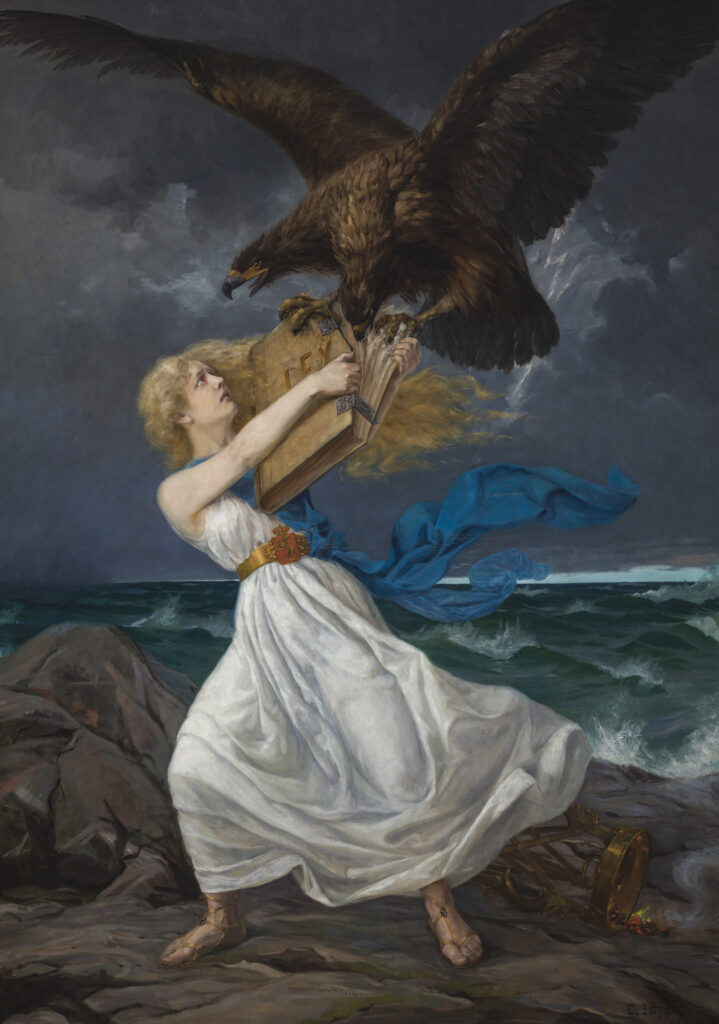
The Attack, Edvard Isto, the Finnish Maiden (Suomineito) attacked by the Russian eagle, credit Wikipedia
Silence Audible
The Northern Silence, Journeys in Nordic Music & Culture, Andrew Mellor, Yale University Press, 300pp, hardback, ISBN 978-0300-25440-2, reviewed by Stuart Millson
The music critic, Andrew Mellor, now a resident of Denmark, has produced in the pages of his ‘Journeys’ a fascinating insight into the Nordic culture and institutions which have clearly captured his soul.
The author begins his story within the glass walls of Helsinki Airport – the starting point that leads to the glass and concrete concert-halls of Scandinavia. The cold, crystal air is breathed in as we leave the airport: Mellor muses on the ‘inaudible breathing’ of the ancient forests of Scandinavia; the pools and boulders of the endlessly-unfolding countryside; and the music of Sibelius, in particular, the seldom-played tone-poem, Tapiola – imbued with the spirit of the innumerable trees, through which gimlet rays of winter sunlight occasionally penetrate.
Tapiola may be the key to unlocking the secret of Nordic music: the work’s tonal strangeness, ‘the rumbling kettledrum with which it sneaks into being’, as Mellor memorably describes it; the sense of diminishing light and the evocation of the silent realm.
As the author observes:
‘Silence, it’s tempting to speculate, had proved itself too intrinsic a part of Sibelius’s musical language for him to resist embracing it fully. Or perhaps from his home in the woods, he let it embrace him.’
Clearly, Nordic ways embraced the author ~ the book suggesting a deep attachment, not just to Sibelian music, but to an altogether better way of living; the satisfaction of belonging to a civic society which values classical music and the arts, as well as offering its citizens some excellent bars and local traditions. Across Scandinavia, we discover, most major towns have orchestras: the concert halls in which they play, considered by local authorities and governments to be as essential to the well-being of citizens as the provision of health centres.
Broadcasting, too, proclaims the paternalism of those predominantly socially-democratic societies; with television schedules including performances by the major and regional orchestras on a scale altogether more ambitious than anything in the United Kingdom. Indeed, this book should provoke feelings of shame and guilt for British readers: revealing how devoid of music the BBC TV schedules have now become. Reithian-type ideals thrive in Scandinavia, even if they are scorned in the land now ‘celebrating’ 100 years of BBC public broadcasting.
Yet even in the more high-minded, culturally authentic societies of the frozen North, the author discerns the spread of modern ‘diversity’ angst. He reports, for example, the views of the artistic director of the Helsingborg Symphony Orchestra, a man named Fredric Osterling, who seems to be in the business of bringing (supposedly) orchestral elitists and their middle-aged audiences down to earth, as this account of a meeting between the two men seems to show:
‘… Osterling claimed, he found an institution wilfully sealed off from reality. “We perceived ourselves as being at the top of some sort of cultural hierarchy but in the view of most people and most politicians, we were expensive and weird – plain weird.” ‘
On the day of the interview with Helsingborg’s (no doubt, highly paid) director, Osterling was: ‘… dressed in shorts and a loose linen shirt, with architect style glasses clamped around the centre point of his bald head.’ Artistic institutions, the world over, have been captured by a politically-correct elite; more interested in dismantling the rituals, formality and sheer presence of musical events, than in securing them for generations to come. Disappointingly, Andrew Mellor’s book makes many references to the social changes taking place in Scandinavia, with the author subscribing to the view that middle-aged audiences from non-diverse backgrounds constitute something of a problem for the arts. Yet whilst it is true that concert-halls and galleries need to bring everyone through their doors, they can achieve this without resorting to a disingenuous exercises in social engineering and Maoist cultural levelling. To attract people to classical music, simply play them classical music. And if the audience is Nordic, well… one cannot help geographical realities.
These caveats aside, The Northern Silence is a compelling take on music and its place in a society. And when describing musical works, passages in Andrew Mellor’s work take on a rare beauty. Like the opening of Tapiola, the book’s story sneaks into being. It deserves to be read by anyone interested or involved in the arts today, or by anyone concerned by the direction in which Western, and not just Nordic countries, appear to be going.
Stuart Millson is the Classical Music Critic of QR
Like this:
Like Loading...












An interesting article.
Sweden especially is going through a lot of imported stress.
The whole of Europe from Ulster to Ukraine needs to protect and promote the civilization uniquely created by its related peoples.